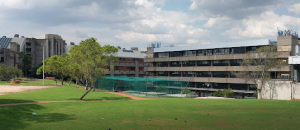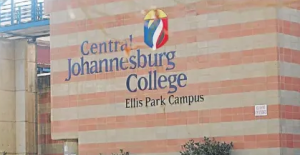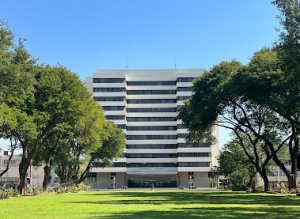The Essentials
Type of Institution: University
Fees per Semester: R20 000 – R75 000
Address: Private Bag X1, UNITRA, 5117, Mthatha, South Africa
Phone Number: (+27) 047-50115270
Chancellor: Nonkululeko Gobodo
Vice Chancellor: Prof Rushiella Songca
Number of students: 30 000+
Website: https://www.wsu.ac.za/
Email: enquiries@wsu.ac.za
Table Of Contents
- Overview
- Contact Details
- Address
- Location
- School Fees
- Courses & Programs
- Vacancies and Entry Requirements
- Logo
- Notable Alumni
- Pros and Cons
- Author’s Review
Overview
Walter Sisulu University (WSU) is a comprehensive public university located in the Eastern Cape province of South Africa. Established in 2005, the university was formed through the merger of three institutions: the University of Transkei, Border Technikon, and Eastern Cape Technikon. It was named after Walter Sisulu, a prominent anti-apartheid activist and leader in the African National Congress (ANC).
Mission and Vision
WSU aims to provide access to higher education for students from rural and disadvantaged backgrounds. The university plays a significant role in the socio-economic development of the Eastern Cape by fostering academic excellence, research, and community engagement.
Campuses and Locations
WSU operates across four main campuses:
Mthatha Campus (Nelson Mandela Drive Site): Located in Mthatha, it’s the largest and historically significant as it houses the original University of Transkei.
Buffalo City Campus: Situated in East London, this campus focuses on engineering, business, and health sciences.
Butterworth Campus: Known for its strong focus on technical and vocational education.
Queenstown Campus: This smaller campus serves mainly local students with a variety of academic programs.
Student Population
The university serves over 30,000 students, many of whom come from historically underprivileged communities. WSU prides itself on offering opportunities for these students to succeed in higher education.
Research and Innovation
WSU has been expanding its research capacity, focusing on areas that are crucial for regional and national development, including rural development, health sciences, and environmental sustainability. The university partners with both local and international institutions for research initiatives.
Challenges and Progress
Like many South African universities, WSU has faced challenges related to infrastructure, student protests, and resource constraints. However, it continues to improve its facilities and expand its academic programs, with a strong commitment to addressing the needs of its diverse student body.
Community Engagement
WSU plays an important role in the local communities, offering health services, educational outreach, and contributing to local development projects. Its focus on applied research helps address the pressing needs of the surrounding regions, such as rural healthcare, education, and economic development.
Walter Sisulu University Contact Details
You can contact Walter Sisulu University via their landline, email or you can visit their website for further contact details.
Phone Number: (+27) 047-50115270
Website: https://www.wsu.ac.za/
Email: enquiries@wsu.ac.za
Walter Sisulu University Address
Private Bag X1, UNITRA, 5117, Mthatha, South Africa
Walter Sisulu University Location
Walter Sisulu University has several campuses across the province. Its main campus is located in the city of Mthatha in the Eastern Cape province of South Africa.
Walter Sisulu University Fees
Walter Sisulu University’s fees is currently standing at R20 000 – R75 000 per year depending on the program you are studying and the level of degree you are studying. Please contact the institution or visit them to get the latest fees structure as it can change at any year or semester.
Walter Sisulu University Courses & Programs
Walter Sisulu University (WSU) offers a wide range of programs across various disciplines, from undergraduate to postgraduate levels. These programs are distributed across its four campuses, with each focusing on different faculties and areas of specialization.
Faculty of Health Sciences
Bachelor of Medicine and Bachelor of Surgery (MBChB)
Bachelor of Nursing
Bachelor of Social Work
Bachelor of Medical Clinical Practice
Bachelor of Health Sciences in Medical Laboratory Sciences
Bachelor of Health Sciences in Radiography
Bachelor of Health Sciences in Physiotherapy
Bachelor of Pharmacy
Diploma in Nursing
Postgraduate Diploma in Nursing (various specializations)
Masters in Nursing Science
Masters in Public Health
Masters and Doctoral Degrees (Health Sciences-related fields)
Faculty of Education
Bachelor of Education (BEd) in Foundation Phase Teaching
Bachelor of Education (BEd) in Intermediate Phase Teaching
Bachelor of Education (BEd) in Senior Phase and Further Education and Training (FET)
Postgraduate Certificate in Education (PGCE)
Advanced Certificate in Teaching
Diploma in Primary Education
Masters and Doctoral Degrees in Education
Faculty of Business, Management Sciences & Law
Bachelor of Commerce (BCom) in Accounting
Bachelor of Commerce (BCom) in Economics
Bachelor of Commerce (BCom) in Business Management
Bachelor of Laws (LLB)
Bachelor of Public Administration
Bachelor of Business Administration
Diploma in Business Management
Diploma in Accounting
Diploma in Public Management
Diploma in Office Management and Technology
Postgraduate Diploma in Business Administration
Masters in Business Administration (MBA)
Masters and Doctoral Degrees in Law and Management Sciences
Faculty of Science, Engineering, and Technology
Bachelor of Science (BSc) in Computer Science
Bachelor of Science (BSc) in Mathematics
Bachelor of Science (BSc) in Biological Sciences
Bachelor of Science (BSc) in Chemistry
Bachelor of Science (BSc) in Physics
Bachelor of Science in Engineering (Civil Engineering, Electrical Engineering, Mechanical Engineering)
Bachelor of Engineering Technology
Bachelor of Technology in Engineering (various fields)
Diploma in Engineering (Civil, Electrical, Mechanical)
Diploma in Information Technology
Diploma in Analytical Chemistry
Masters and Doctoral Degrees in Science and Engineering Fields
Faculty of Humanities, Social Sciences & Communication
Bachelor of Arts (BA) in Communication
Bachelor of Arts (BA) in Journalism
Bachelor of Arts (BA) in Psychology
Bachelor of Arts (BA) in Sociology
Bachelor of Arts (BA) in History
Bachelor of Social Sciences
Diploma in Journalism
Diploma in Public Relations
Postgraduate Diploma in Media Studies
Masters and Doctoral Degrees in Humanities and Social Sciences
Faculty of Agriculture
Bachelor of Science in Agriculture (Agricultural Economics)
Bachelor of Science in Agriculture (Animal Production)
Bachelor of Science in Agriculture (Crop Production)
Diploma in Agriculture
Masters and Doctoral Degrees in Agricultural Sciences
Short Courses and Certificates
WSU also offers various short courses and certificate programs across different faculties. These include:
Project Management
Human Resource Management
Public Administration
Financial Management
Information Technology Certifications
Health and Safety Management
Early Childhood Development (ECD)
Walter Sisulu University Vacancies and Entry Requirements
Entry Requirements
The entry requirements for students vary depending on the program and level of study (undergraduate or postgraduate).
Undergraduate Admission Requirements
National Senior Certificate (NSC):
Applicants must have a National Senior Certificate (NSC) with endorsement for degree/diploma studies.
Minimum of 30 NSC points for degree programs (though specific programs may require higher points).
Minimum of 24 NSC points for diploma programs.
At least 50% (Level 4) in the language of learning and teaching (English).
Specific Program Requirements:
Some programs have additional or specific subject requirements:
Health Sciences (e.g., MBChB, Nursing): A strong performance in Mathematics, Physical Sciences, and Life Sciences (minimum Level 5 or 6 in each).
Engineering and Technology: Mathematics and Physical Sciences (minimum Level 5 or 6).
Commerce and Law: Good grades in Mathematics or Mathematical Literacy, and English.
Education: Varies based on the phase of teaching. Generally requires English and a second language.
National Benchmark Test (NBT):
Some programs may require applicants to take the National Benchmark Test (NBT) to assess academic readiness.
Recognition of Prior Learning (RPL):
WSU offers RPL opportunities for individuals who have relevant work experience but lack formal qualifications. This allows mature students to gain admission based on experience.
Postgraduate Admission Requirements
Honours Programs: A relevant bachelor’s degree (or equivalent qualification) with a minimum average of 60% in the final year of undergraduate study.
Master’s Programs: An honours degree or a four-year degree (e.g., BSc, BTech) in a related field, usually with a minimum of 60%.
Doctoral Programs: A master’s degree in a related field with a demonstrated ability to conduct independent research. Some programs may require a research proposal submission and an interview.
International Students
Must have qualifications that are equivalent to the South African National Senior Certificate (NSC) and meet program-specific requirements.
Proof of English language proficiency (if applicable), such as an IELTS or TOEFL score.
All foreign qualifications must be evaluated by the South African Qualifications Authority (SAQA).
A valid study visa is required for the duration of the program.
Application Process
Apply Online: WSU offers an online application platform for both South African and international students.
Required Documents:
Certified copies of your NSC or equivalent qualification.
Identity document or passport (for international students).
Proof of payment for the application fee (non-refundable).
Academic transcripts (for postgraduate applicants).
Application Deadlines: Vary depending on the program, but it’s advisable to apply early to secure a spot.
For the most accurate and detailed information regarding vacancies and student entry requirements, it is recommended to visit WSU’s official website or contact the respective faculties directly.
Walter Sisulu University Logo
Below is the logo of Walter Sisulu University with excellent quality and it is available to download in PNG (transparent file) JPEG and PDF.
Walter Sisulu University Logo
Walter Sisulu University Notable Alumni
Berita – Zimbabwean singer and songwriter
Terence Nombembe CA (SA) – Auditor-General of South Africa from 2006 to 2013 (B.Com 1982)
Nonkululeko Gobodo CA(SA) – first black female CA (SA) (B.Com)
Nomgcobo Jiba – advocate, first Deputy National Director of Public Prosecutions
Tembeka Nicholas Ngcukaitobi – lawyer, public speaker, author and political activist.
Mandisa Muriel Lindelwa – first female President of the Supreme Court of Appeal
Lwazi Lushaba – intellectual
Lungile Pepeta – paediatric cardiologist, medical researcher, university professor and activist
Ncumisa Jilata – neurosurgeon
Walter Sisulu University Pros and Cons
Pros
Diverse Academic Programs: WSU offers a broad range of programs across various faculties including health sciences, engineering, business, education, and humanities. This diversity allows students to choose from numerous career-focused fields of study.
Commitment to Community Engagement: The university has a strong emphasis on community service and development. Students often engage in projects that benefit local communities, providing practical experience while contributing to social change.
Affordability: WSU is known for offering relatively affordable tuition fees, which makes higher education more accessible to students from diverse socio-economic backgrounds.
Supportive Learning Environment: The university provides various support services such as academic advising, career counseling, and student health services to help students succeed both academically and personally.
Focus on Research and Development: WSU emphasizes research and innovation, particularly in areas that address local and regional challenges. This focus provides opportunities for students and staff to engage in meaningful research activities.
Strong Regional Presence: With multiple campuses in the Eastern Cape, including in Mthatha, Bisho, Cala, and Komani, WSU has a significant regional presence, making it accessible to students in the Eastern Cape.
Emphasis on Practical Training: Many programs include work-integrated learning or practical components, ensuring that graduates are well-prepared for the job market with hands-on experience.
Inclusive and Diverse Student Body: The university serves a diverse student population, promoting an inclusive learning environment that enriches the educational experience.
Cons
Infrastructure Challenges: Some campuses may face infrastructure issues such as outdated facilities or limited resources, which can impact the learning environment and student experience.
Overcrowding and Resource Limitations: Like many institutions, WSU may experience overcrowded classrooms and limited access to resources or facilities, which can affect the quality of education and student satisfaction.
Administrative Efficiency: Students have reported issues with administrative processes, such as delays in handling applications, financial aid, and academic records, which can be frustrating.
Limited Postgraduate Opportunities: The range of postgraduate programs offered at WSU may be more limited compared to larger, more research-focused universities, potentially restricting options for advanced study.
Location-Related Issues: Some students may find the geographical location of WSU’s campuses challenging, particularly if they are located in more remote or rural areas, affecting accessibility and convenience.
High Dropout Rate: The university, like many others, faces challenges with a high dropout rate, which can be attributed to various factors including academic pressure, socio-economic issues, and inadequate support services.
Limited Industry Connections: While WSU is improving, there may be fewer strong industry connections compared to other major institutions, potentially impacting internship and job placement opportunities for students.
Variable Quality of Facilities: The quality of facilities and resources may vary significantly across different campuses, potentially leading to inconsistencies in the student experience and available amenities.
Author's Review
Walter Sisulu University (WSU) is a significant institution in South Africa, particularly known for its commitment to providing accessible and diverse education across the Eastern Cape region.
With a range of programs spanning fields such as health sciences, engineering, business, education, and humanities, WSU offers students valuable opportunities to pursue career-focused education in a supportive and inclusive environment.
However, the university faces challenges that include infrastructure issues, overcrowded classrooms, and administrative inefficiencies. These factors, along with a limited range of postgraduate programs and potential geographical constraints, can impact the overall student experience.
Despite these hurdles, WSU’s strengths in affordability, community involvement, and practical learning opportunities make it a notable choice for students in the Eastern Cape and beyond.
In summary, Walter Sisulu University stands out as an institution committed to accessible education and community development. While there are areas for improvement, particularly in terms of infrastructure and administrative processes, WSU continues to play a vital role in providing quality education and fostering a supportive environment for its students.



